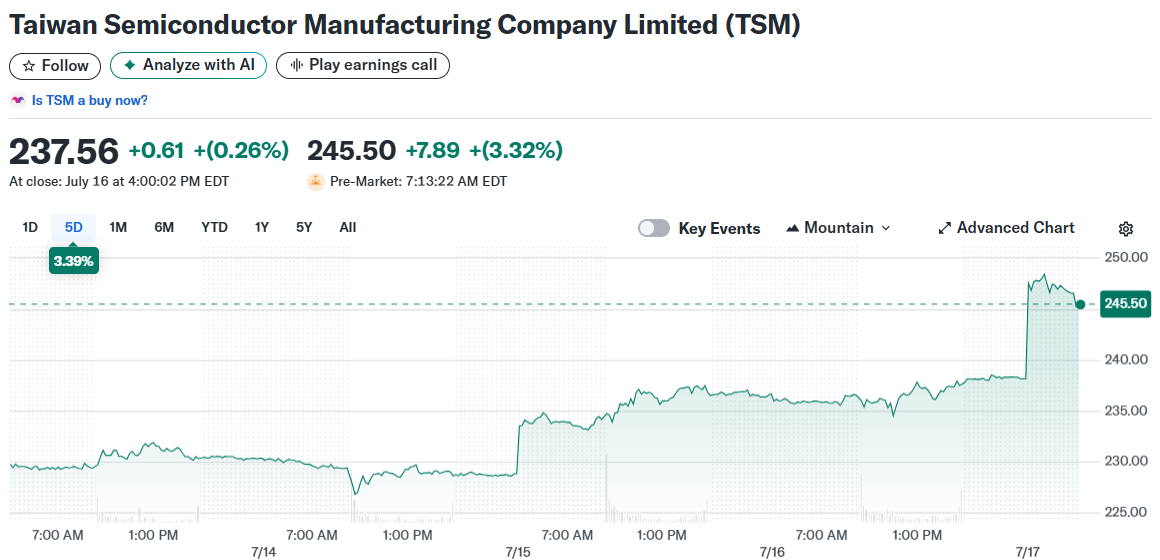TLDR
- TSMC reported record quarterly profit of $13.5 billion, up 60.7% year-on-year, beating analyst expectations
- Company raised full-year revenue growth outlook to 30% in U.S. dollar terms, up from mid-20s forecast
- Third quarter revenue expected to jump up to 40% with strong AI chip demand continuing
- Taiwan dollar appreciation against U.S. dollar will hurt margins, with Q3 gross margin expected to fall to 55.5-57.5%
- Management warns fourth quarter earnings could face impact from potential U.S. tariffs and other uncertainties
TSMC delivered a knockout punch in the second quarter, posting record profits that left analysts scrambling to revise their estimates upward. The world’s largest contract chipmaker reported net profit of T$398.3 billion ($13.5 billion), crushing the T$377.9 billion consensus estimate.
🚨 $TSM with another monster quarter 🚨
– Revenue $31.6B vs. 30.2B expected 🟢
– EPS $2.60 vs. $2.38 expected 🟢
– Gross Margin 58.6% vs. 57.9% expected 🟢
While $ASML continues to struggle, $TSM is not facing any slowdown whatsoever.
And come on, these margins…. Net… pic.twitter.com/cKXFDXA9Hz
— TacticzHazel – Value Investing (@TacticzH) July 17, 2025
The 60.7% year-over-year profit surge marked the company’s fifth consecutive quarter of double-digit growth. Revenue climbed 44% to $30.07 billion in U.S. dollar terms, with quarterly sales reaching NT$933.8 billion.
CEO C.C. Wei couldn’t hide his enthusiasm about AI demand during the earnings call. “Demand for artificial intelligence was getting stronger and stronger,” he told investors. The company now expects AI-related chip revenue to double in 2025.
TSMC raised its full-year revenue growth outlook to around 30% in U.S. dollar terms. The previous forecast called for growth “close to the mid-20s.” Third quarter revenue is expected to jump between $31.8 billion and $33.0 billion.

The earnings beat sent U.S.-listed shares soaring 3.7% in premarket trading. Taiwan-listed shares have climbed just 5% year-to-date despite last year’s 80% surge, weighed down by tariff worries and currency headwinds.
Currency Headwinds Hit Margins
The Taiwan dollar’s 12% appreciation against the U.S. dollar this year is creating margin pressure. Third quarter gross margin is expected to fall to between 55.5% and 57.5%, down from 58.6% in the second quarter.
Investment in new U.S. and Japanese factories is also weighing on margins. CFO Wendell Huang said the company’s $38 billion to $42 billion capital expenditure plan for the year remains unchanged.
TSMC announced a $100 billion U.S. investment plan with President Donald Trump at the White House in March. This comes on top of $65 billion pledged for three Arizona plants, with one already operational.
Mass chip production began at the Arizona facility in the fourth quarter of 2024. Construction of the second plant has been completed, with the company planning to manufacture 2-nanometer chips in Arizona by 2028.
The company expects strong demand for its leading-edge process technologies to continue supporting business in the third quarter. AI and high-performance computing applications remain the primary growth drivers.
Tariff Uncertainty Clouds Outlook
Trump has threatened semiconductor-specific tariffs, with Taiwan facing a potential 32% reciprocal tariff rate mentioned in April. TSMC has so far avoided tariffs due to White House exemptions for semiconductors and related equipment.
Wei struck a cautious tone about the fourth quarter during the earnings call. “We are taking into consideration the possible impact of tariffs and a lot of other uncertainties, so we are becoming more conservative,” he said.
The company hasn’t seen changes in customer behavior yet, but management is preparing for potential disruptions. The U.S. Department of Commerce is investigating whether tariffs should be imposed on national security grounds.
Key customer relationships remain strong, with Nvidia recently receiving permission to resume H20 AI chip sales to China. “China is a big market, and my customer can continue to supply the chip to the big market,” Wei noted.
Apple’s performance in China could also affect second-half earnings, according to Mega International Securities’ Allen Huang. Apple typically launches new products in the fourth quarter, making its China sales performance a key factor.
TSMC’s client roster includes Nvidia for AI chips, Apple for iPhone processors, Qualcomm for mobile chipsets, and Advanced Micro Devices for various processors. The company expects AI-related revenue to grow at a mid-40% annual rate for the next five years.
CFO Huang emphasized that capital expenditure cuts are “very unlikely” going forward, signaling continued investment in capacity expansion despite margin pressures.






